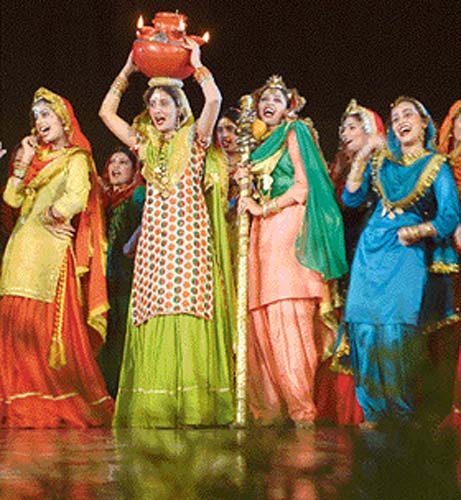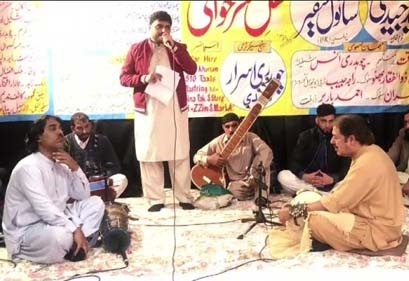
Revival of traditional Pothohari folk music to promote love, peace
Majid Abbasi
Rawalpindi: As a custodian of the oldest civilization and hallmark of the rich cultural heritage of Pakistan, the traditional folk music of Pothohar region is vital for promoting soft image of the country through the message of love and peace in the medium of universal language.
Over the years, the arts, crafts and other cultural activities that used to be the pride of the region have not been given due attention. As a result, the younger generation hardly knows about the roots of their cultural heritage, particularly the traditional folk music.

Mian Muhammad Bakhsh, writer of the book “Saif-ul-Malook” is one of the famous poets of the region.
Other regional poets are the late Master Nisar, Anwer Firaq, Sayyein Faraz Weeran and Waheed Qasim. Starting in the mid-20th century, a new form of popular folk music evolved from traditional folk music.
This process and period is called the (second) folk revival and reached a zenith in the 1960s. Earlier, there was no copyright on the songs.
Like several others, the late Alam Lohar, the world famous South Asian singer was classified as a folk singer of Punjab.
The people of the Pothohar region had colossal love with their traditions, culture, literature and folk music.
The folk music, a ‘Lok Baithak’ was the main folk event of Pothohari people where they used to serve it for multiple purposes of association, camaraderie, entertainment, social cohesion, knowledge sharing, creation of disciplinarian and organizational spirit and above all, hub of promotion of art and culture in the general communities.
‘Sammi’ is also a traditional form of dance in the Pothohar region. Men usually perform the Sammi dance during conventional Punjabi parties. Commonly, it has a slow flow and people dance in a circle.
This is very similar to the Dhamal dance in terms of its leg movement. People implement a hopping sequence, along with using sticks in their hands. The playing of the dhol is also common.
It is also performed by women, who dress in bright colourful kurtas and lehengas. Women also wear a silver hair accessory while doing this dance sequence.
Mirasis are also a unique class of entertainers in the Pothohar region who never miss an opportunity to collect Lag (tips) from their patrons on festive occasions. They entertain the guests with their mirthful songs and anecdotes, trace the genealogical trees of their patrons and narrate witty stories about their ancestors.
Pothohar folk music and poetry reading were very popular in this region as such programs have been pulling a big crowd. The festivals were organized with an aim to promote the rich musical heritage of the Pothohar.
Back in the 70s, Lok festivals used to be organized in different cities to exhibit handicraft products along with live display by folk artists to make exquisite depiction of the country’s rich cultural heritage.
The festivals were used to entertain the audience while reflecting the rich rural face of Pakistan highlighting the crafts and folk culture.
The traditional folk music is slowly faded away due to several reasons: one being the non-patronage of the artists while others switching over to modern music.
The experts have called for initiatives to promote the artisans and artists of the country besides patronization of master artisans, folk artists and musicians of all provinces and regions.
They urged the authorities to take solid steps to organize Lok festivals. The focus of the festivals should be to foster provincial harmony and national integration which is much-needed to build a more prosperous and bright future for Pakistan.
Likewise, the local folk singers of Pothohar and artists have shown concern over the lack of official patronage as their art had been fading away over the last few decades posing a threat to craft making and folk music.
They feared if their skills and techniques were not preserved, it would cause a serious loss to traditional handicraft products and folk music which were bread and butter of the artists.
Altaf, one of the local folk singers, said that their business had dwindled to a dismal 70 to 80 percent due to the fast changing world. The folk singers used rabab, table, dholak, daf, zerbaghali, harmonium and guitar but now, the instruments were not available in the market.
He said the artisans crafting traditional musical instruments due to lack of government patronage were also switching over to other businesses to earn their livelihood.
Moona, a student at National College of Arts (NCA) Rawalpindi said the traditional cultural activities of Punjab could help promote the culture of love and peace in the society.
All out efforts should be made to preserve the rich cultural heritage of Pakistan by promoting the artists and craftsmen, but mere lip service would not serve the purpose, she added.
Director Rawalpindi Arts Council (RAC), Waqar Ahmed while talking to the agency said that the provincial government under the leadership of Chief Minister Sardar Usman Buzdar, was working to reclaim the lost glory of the province through a number of initiatives.
The Chief Minister’s love for culture and heritage and interest in crafts and music with a strong desire to promote the cultural heritage of Punjab has translated into the formation of the Punjab Cultural Advisory Council.
